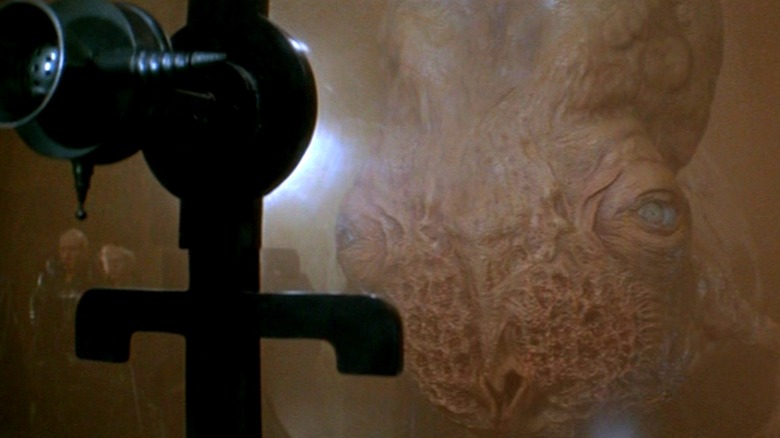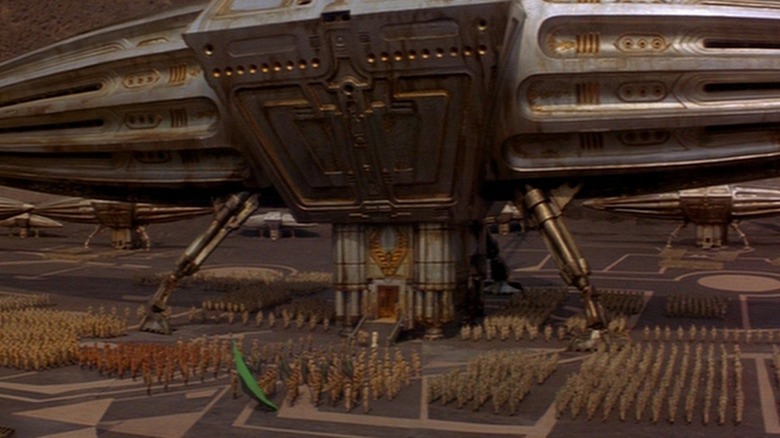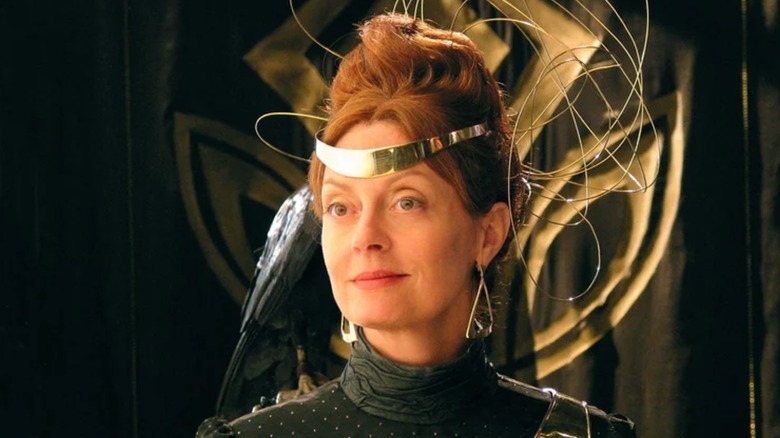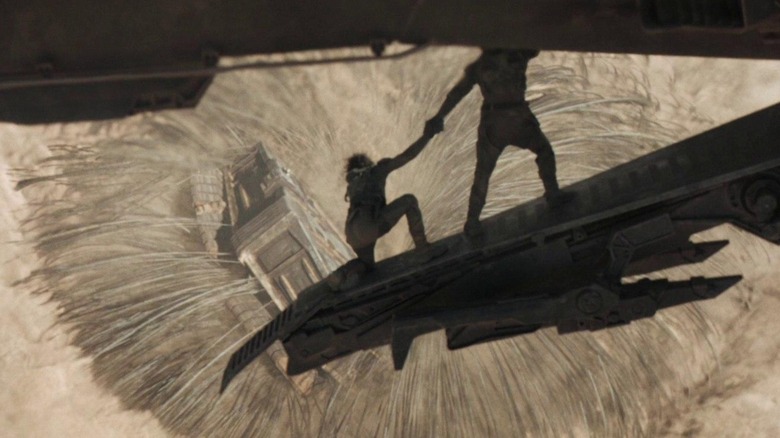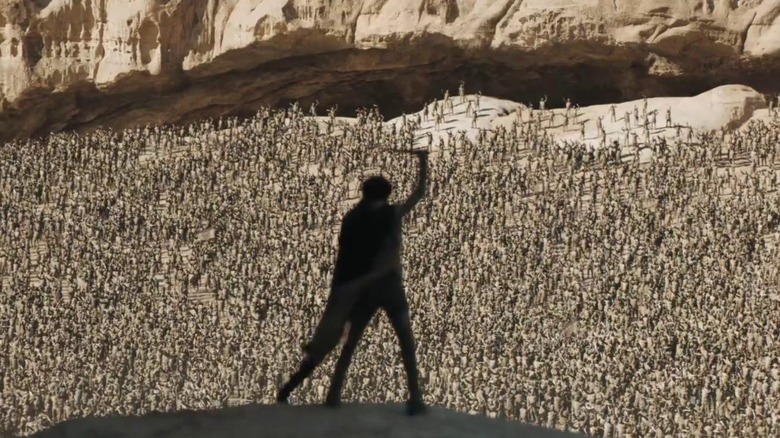All 6 Dune Books By Frank Herbert, Ranked
Frank Herbert is the man responsible for creating one of the most beloved sci-fi universes of all time. The acclaimed author's novel, "Dune," was published in 1965, and since then, the sci-fi genre has never been the same.
"Dune" is an epic tale of interstellar empires and space-age religious warfare. The novel has been adapted multiple times, but somehow the "Dune" movies get major story details wrong almost every time. Even the best of the films can't quite capture the full magic of Herbert's imaginative novel. But while the story of "Dune" is strange and thrilling, it's just the beginning of the author's full epic. Herbert wrote five other novels in the series, and, had he lived longer, he likely would have written more.
Herbert's other novels carry the "Dune" universe thousands of years into its future and tell stories of cataclysmic warfare, oppressive dictatorships, and the power of the human spirit. Every book in the series is worth reading, but, admittedly, some of them are better than others. On Goodreads, fans of Herbert's series have established a ranking that provides a good baseline for how fans feel about each of the novels, but the most popular opinion isn't always the correct one. With that in mind, and having read all of the books and therefore having firsthand knowledge of how they compare to each other, here's how Herbert's world-renowned series of books stack up against each other in our eyes.
6. Chapterhouse: Dune
"Chapterhouse: Dune" is the final "Dune" book written by Frank Herbert, and it picks up more or less where the previous novel, "Heretics of Dune," leaves off. The terrifyingly powerful Honored Matres are charging across the galaxy with the goal of total conquest, and the Bene Gesserit are losing the battle. The planet Dune has been destroyed, driving the Bene Gesserit to a world called Chapterhouse, which they are reverse-terraforming. The Bene Gesserit hope to raise sandworms on Chapterhouse so they can harvest and maintain control over the spice melange while fighting the Honored Matres.
Alas, due purely to the lack of a truly satisfying conclusion to its story, "Chapterhouse" lands at the bottom of this list. Because Herbert had plans for more "Dune" novels, "Chapterhouse" ends on a massive cliffhanger. Unfortunately, the author died in 1986, the year after he published "Chapterhouse." Herbert's plans for the end of the "Dune" series were eventually picked up by his son, Brian, who wrote two books that continue the story from where his father left it. For diehard fans, however, the writing in the last two books just doesn't compare to Herbert's original work.
5. Heretics of Dune
"Heretics of Dune," the sequel to "God Emperor of Dune," is the second book in the series to hit readers with a massive time jump. The novel opens 1,500 years after the end of "God Emperor" and the death of Leto Atreides. That means it's been 5,000 years since the reign of Paul Atreides, and the universe is starting to look pretty different.
Once Leto's oppressive imperial regime came to an end, space travel once again became a prominent part of life in the galaxy. The Scattering saw humans spread out to the stars, leaving behind their old worlds and ways of life. The human race is more scattered and separated than ever, but once again, an important moment for the species is brewing on the planet once known as Dune. Much of Leto's terraforming work has been undone, and the desert has stretched back across the surface of the planet. Despite this, sandworms are rarer than ever, and it seems like their time may truly be coming to an end. With the future of Dune and all of humanity beginning to seem uncertain, the Bene Gesserit turn their attention to a girl named Sheeana who can control the sandworms. She might be able to fulfill a prophecy left behind by the omniscient former God Emperor and change the fate of humanity forever.
"Heretics" is an utterly fascinating read because it describes a society so different from the ones introduced in the earlier novels. The book establishes an entirely new cast of characters and set of conflicts, but it suffers a little because some of its stories are left unresolved. "Heretics" doesn't have the dramatic cliffhanger ending of its sequel, "Chapterhouse," but it is the first piece of a planned trilogy that Frank Herbert never got to finish, and that lack of a conclusion hurts it.
4. Children of Dune
"Children of Dune" is where we really get to know the twins of Paul Maud'Dib, Ghanima and Leto II. The plot largely revolves around an attempt to assassinate the siblings with the goal of ending Paul's lineage and disrupting the current era of the empire. The power of foresight and Paul's Golden Path also come back into play in a big way, and the book begins to explore some of the other factions in the galaxy that have their own plans for seizing power from the Atreides. The final act of the book introduces the beginning of Leto's transformation into an immortal worm-human hybrid being, which sets up the story of "God Emperor of Dune." The novel also manages to slip the death of Paul Atreides into the main plot.
"Children" has the difficult job of concluding Paul's story and teeing up Leto's next chapter, and the way the book manages to make that transition for the series is beyond impressive. On top of that, "Children" tells a significantly more self-contained story than "Heretics." At the same time, "Children" is still a bridge work that can't really stand on its own without the novels on either side of it.
According to Goodreads, "Children of Dune" is the second-best book in the series with a 3.96 star rating — but here, we have to disagree. "Messiah" has slightly more thematic resonance for the series, and "God Emperor" fully capitalizes on the ideas that get set up in "Children." Because those two other Frank Herbert novels are so strong on their own, we have to put "Children" in fourth place.
3. God Emperor of Dune
"God Emperor of Dune" is the beginning of an entirely new era for Frank Herbert's series. It's the first book to include a significant time jump, and Herbert makes it clear that he really wasn't playing around with his "Dune" franchise timeline. "God Emperor" picks up 3,500 years after the end of "Children of Dune," and quite a bit has changed in all that time. Leto II has continued his transformation into a sandworm-human hybrid, a change that has rendered him basically immortal. As eternal emperor, Leto has oppressed the entire galaxy, all but shutting down spice trade and making human space travel virtually impossible.
Leto's reign has been destructive for the empire but incredibly prosperous for Arrakis. He continued the terraforming work that had begun even before Paul's time, but he used his resources as emperor to kick the plan into overdrive. Arrakis is green and luscious, and the desert and worms have all but vanished from the planet. Into this strange world steps a clone of Duncan Idaho, who Leto wants at his side. Duncan must come to terms with the state of the world while also navigating the intricacies of Leto's plans for the universe and the many, many plots against the God Emperor's life.
Strange, heavy, and philosophical, "God Emperor of Dune" can be a slow journey at times, but it's one of the most rewarding books in the series to read.
2. Dune: Messiah
Having to write a sequel to one of the most groundbreaking sci-fi books of all time is not an enviable task, but it's a challenge that Frank Herbert actually looked forward to. While working on the original novel, Herbert also outlined his plans for the second and third books in the series. Anyone who reads "Messiah" and then goes back to "Dune" can definitely see the seeds for the sequel that Herbert planted in the first book. Paul's story, it seems, was always meant to end this way.
In the novel, which begins 12 years after the events of "Dune," Paul's forces are waging war across the galaxy. And though he's deeply disturbed by the death being caused in his name, Paul knows, because of his prescient vision, that his war is preventing even worse disasters. While Paul is struggling with the weight of being seen as a messiah to the Fremen, outside forces are working to ensure that his reign as emperor is a short one. As if that weren't enough pressure to deal with, Paul's wife, Chani, is pregnant with twins, and it seems as though every family member's life is currently hanging in the balance.
"Dune: Messiah" is an excellent sequel that deserves to be as widely known as the original novel. Unfortunately, prior to director Denis Villeneuve's take on the book, it had only been adapted once, in Sci Fi Channel's difficult-to-find "Dune" miniseries.
1. Dune
Is it any surprise that "Dune" is at the top of this list? Frank Herbert's 1965 masterpiece is an undeniably classic novel that has influenced generations of sci-fi writers, filmmakers, game designers, and more. "Dune" introduced readers to a completely new, utterly unique universe and laid the groundwork for the rest of the author's epic series. As the first chapter in a massive epic story, it has the difficult job of explaining the Imperium, the spice trade, the Bene Gesserit, and all the other aspects of Herbert's universe. But, somehow, the novel still manages to be the most approachable book in the series.
The real strength of "Dune" is that the story follows the archetypal hero's journey. Paul Atreides is the son of Duke, sent to rule a foreign desert world, Arrakis, where traps and dangers abound. When Paul's family is destroyed and scattered to the wind, he takes refuge in the planet's hostile environment, where he begins to plan his revenge against his enemies. Paul's quest ultimately leads him to the Fremen, the native people of Arrakis, and his battle has the potential to result in the deaths of billions across the universe.
"Dune" is an enthralling trip to another world, which is why it has inspired countless adaptations, spin-offs, and imitators. It's not just the best book in Herbert's renowned series but also one of the greatest sci-fi novels ever written.

